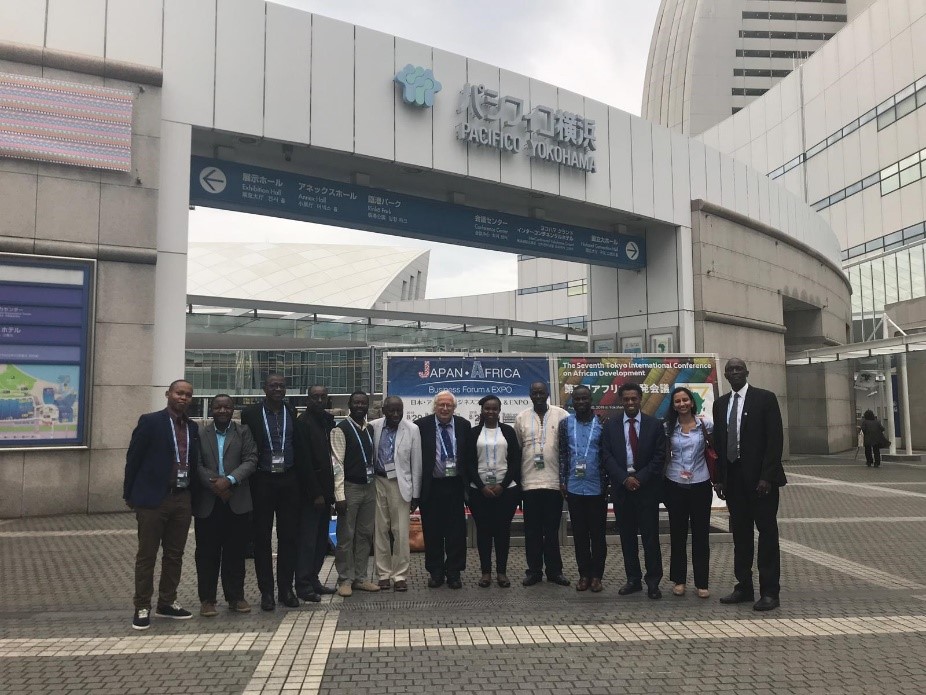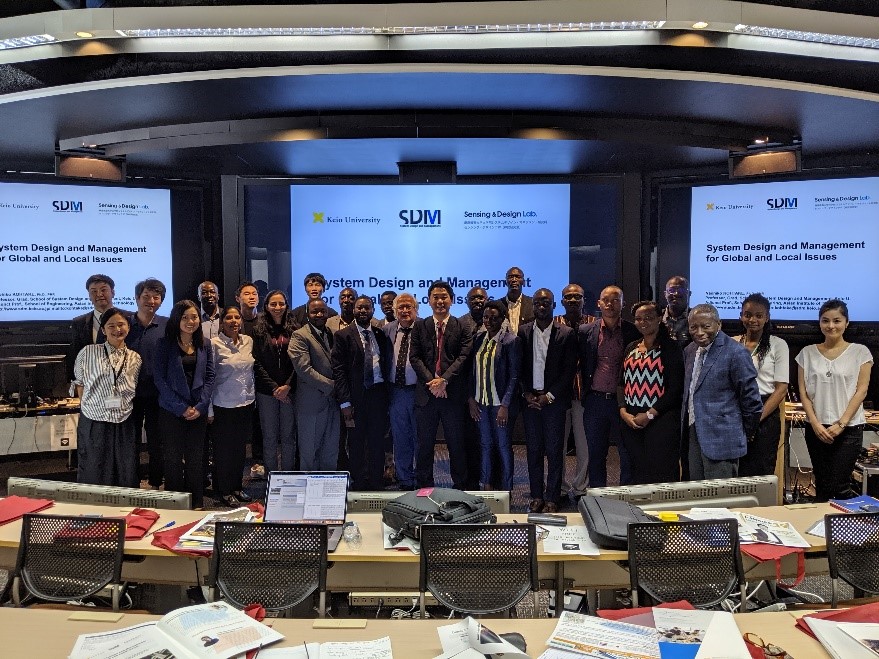 Photo: In front of the TICAD VII venue in Yokohama. Photo Credit: Dharini Natarajan, World Bank
Photo: In front of the TICAD VII venue in Yokohama. Photo Credit: Dharini Natarajan, World Bank
Africa and Japan have made further inroads to explore collaboration opportunities in science, technology and innovation (STI) through the pan-African Regional Scholarship and Innovation Fund (RSIF) under Partnership for skills in Applied Sciences, Engineering and Technology (PASET) and Africa Centres of Excellence (ACE) (ACE I for West and Central Africa and ACE II for East and Southern Africa) platforms. As a continuum of the 1st workshop in Japan in October 2018, which resulted in 10 MoUs, the 2nd Africa-Japan Higher Education partnership workshop focused more on industry partnership development and introduction of RSIF.
Hosted by the Government of Japan from August 27 to September 3, 2019 a delegation of African universities from RSIF and ACE and representatives from the PASET, RSIF Regional Coordination Unit, icipe, and the World Bank visited Japan to explore opportunities to collaborate with Japanese universities, companies and research institutions. African university representatives and scholars were from Benin, Burkina Faso, Ethiopia, Ghana, Kenya, Malawi, Nigeria, Rwanda, and Tanzania.
The visit first began in Yokohama from August 27-30, 2019 where participants attended the 7th Tokyo International Conference for Africa’s Development (TICAD 7). The conference, held once every three years to promote Japan-Africa collaborations, offered an excellent space to attend seminars on a variety of topics, including energy, agriculture, water, and STI, to network with Japanese companies, universities, and researchers, and learn about research and innovations through exhibitions.
On August 29, the World Bank organized an official side event on Fostering Africa Japan university partnerships in science, technology, and innovation to introduce the PASET and ACE programs, and discuss the benefits and challenges of university partnerships between Africa and Japan. Attended by over 100 participants, the event concluded successfully by attracting a lot of interests from universities, funding agency and private sector, and the Deputy Director General of the International Bureau from the Japanese Ministry of Finance announced the financial support for education through the World Bank including Africa-Japan higher education partnerships.
 Photo: At Keio University. Photo Credit: Keio University
Photo: At Keio University. Photo Credit: Keio University
Following a fruitful four-day visit in Yokohama, the delegation visited Keio University’s entrepreneurship and innovation program called EDGE, and learned more about the System Design and Management (SDM) program offered there. The delegates also visited multiple companies including Ricoh, Softbank and Sony Computer Science Laboratories (CSL) to acquire first-hand knowledge on the companies’ technology and innovation and ongoing initiatives in Africa. Participants explored potential collaboration opportunities in the area of big data analytics leveraging satellite data from Japan Aerospace Exploration Agency (JAXA) and an expansion of ongoing pilot activity at the company.
On September 2-3, university-university and university-industry partnership seminars were organized at the World Bank Tokyo office. Seminars included presentations by nine African universities on their research and innovation, RSIF PhD scholars’ research presentations, and the partnership development case study from Sophia University and Sokoine University of Agriculture from Tanzania. In both seminars, collaboration opportunities with PASET RSIF and ACE platforms were introduced.
During the university-industry partnership seminar, participants discussed Africa’s unmet needs with selected universities, including a conversation on the lack of well-designed toilets to avoid water contamination, and theack of access to electricity in rural areas.
Professor Francis Wanjala from University of Nairobi mentioned how these issues can be turned into business opportunities. “There are great potential opportunities in developing relatively cheaper and affordable effective solar panels” said Francis Wanjala. As an example of university-industry partnership, Dr. Mussa Ally from Nelson Mandela African Institution of Science and Technology introduced the collaboration with a brewery company. We are working with certain brewery company whereby we are cleaning their water which can be used in irrigation. The problem is to scale up the protype, you cannot mass produce because of the cost involved” he said.
Through the panel discussion among industry representatives, participants learned that the company sees the university as an important trustworthy non-profit partner that they can rely on. The companies also consider universities as good research partners for a product development.
Mitsuo Omine, Board Member and CTO at Y’s Global Vision Inc. underscored that “universities are able to research about water quality from various angles. Some of the challenges for us is to lower the initial cost, keep the running cost low, but making it endurable and that is why doing a research with the university about the water quality and develop the water filter is required.”
In total of more than 150 participants from the two-day seminars created various partnership opportunities with follow up action. At the government level, discussions took place with the Japanese Ministriesy of Finance, Economy, Trade and Industry (METI), and Education, Culture, Sports and Technology (MEXT), the Japan Science and Technology Agency (JST), and JICA.
Given the Government of Japan’s numerous schemes of collaboration with Africa such as internships, study abroad and research opportunities, these existing schemes will be leveraged to support present partnership activities. For instance, Ehime University and Aquaculture and Fisheries (AquaFish) center of excellence at Lilongwe University of Agriculture and Natural Resources in Malawi announced their successful SATREPS research grant award from JST, recognizing their arduous efforts over the past few years. Participants and partners look forward to identifying greater results from the partnerships established during the visit.
Media coverage:
Press Release – https://www.worldbank.org/en/news/press-release/2019/08/29/world-bank-japan-to-support-human-capital-development-through-education-in-africa
University World News - https://www.universityworldnews.com/post.php?story=20190918102125681


